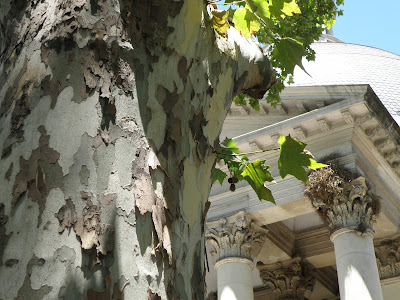A plaza in Belgrano
The entrance to the Barrio Chino
I spend a bit of time in the little stores that sell all kinds of useless and tacky toys and gadget, then move on the the supermarkets, to check out the strange condiments, the selection of teas and the dried mushrooms and vegetables. There is also a great kitchen store, where I linger looking at the teapots with longing.
Weird juice with bits of stuff floating inside
A cool yerba mate packaging
Dried mushrooms and aubergines
Ginger!
Gangly green vegetables
More juice
My browsing satisfied (I do not buy anything - with my change of accommodation pending), I return to Palermo Soho to window-shop. Later, I sit down outside a café with the intention to write, but I am interrupted by a man on a cellphone asking me if I have a pen I could lend him. His phone conversation finished, he starts talking to me. It turns out Roberto is a Spanish teacher, working independently, with his own unique method of teaching. He explains his teaching philosophy to me with great enthusisam. His classes to not require any textbooks or follow any manuals, and no matter the level of the student, the use of English or other languages but Spanish, whether written or oral, is prohibited. All classes are private, and are held in the location chosen by the student, whether it be in his house, walking through a particular barrio, cooking a meal or going to the theater. That way, everything we learn is useful to contexts of daily life and Argentinian culture. By this time, I was quite convinced (id you noticed by the use of 'we') that these classes might be worth a try. What more, Roberto's daughter had recently moved away, and he had a room to rent in his apartment. I mulled this information over as we talked. Throughout the conversation, Roberto was subtly testing my level of Spanish and teaching me new words and expressions. Before I knew it, the afternoon had slipped away and it was dark. Roberto told me I could take a look at the room anytime I wanted and since it convened to the both of us, we settled for straight away. We walked over to the apartment, which was only a short walk away, and he showed me around, from the bathrooms to his book collections. He said I could move in whenever I wanted, even if it was just while I looked for something for permanent. I told him I would think about the offer, but on by way back to the hostel (in a taxi–the subte was closed!) the proposal seemed more and more appealing. Hostel-living is not suited for the long term, and I was already getting tired of the crowd. When there is always something going on around you, there is a certain pressure to always be part of that activity. Alone time and intellectual pursuits are both impossible and ill-fitted to such an ambiance.
For my last night in a hostel, I joined a group of Brits and Australians for dinner, and afterwards, we played spoons (the card game) until late.



















0 comments:
Post a Comment